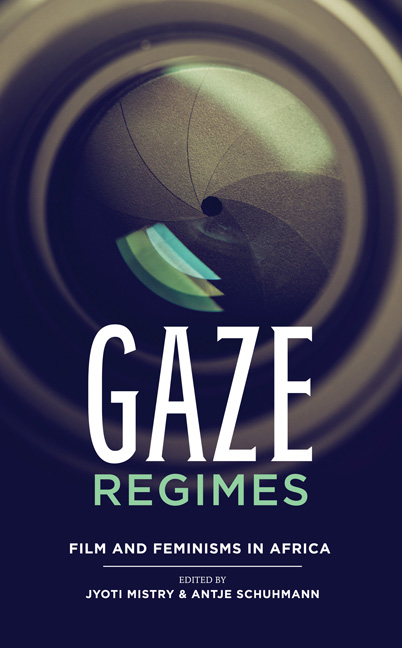Book contents
- Frontmatter
- Contents
- Acknowledgements
- Foreword: Goethe-Institut sub-Saharan Africa
- Introduction: By way of context and content
- 1 African Women in Cinema: An overview
- 2 ‘I am a feminist only in secret’
- 3 Staged Authenticity: Femininity in photography and film
- 4 ‘Power is in your own hands’: Why Jihan El-Tahri does not like movements
- 5 Aftermath – A focus on collective trauma
- 6 Shooting Violence and Trauma: Traversing visual and social topographies in Zanele Muholi's work
- 7 Puk Nini – A Filmic Instruction in Seduction: Exploring class and sexuality in gender relations
- 8 I am Saartjie Baartman
- 9 Filmmaking at the Margins of a Community: On co-producing Elelwani
- 10 On Collective Practice and Collected Reflections
- 11 ‘Cinema of resistance’
- 12 Dark and Personal
- 13 ‘Change? This might mean to shove a few men out’
- 14 Barakat! means Enough!
- 15 ‘Women, use the gaze to change reality’
- 16 Post-colonial Film Collaboration and Festival Politics
- 17 Tsitsi Dangarembga: A manifesto
- Acronyms and Abbreviations
- List of Contributors
- Filmography
- Index
10 - On Collective Practice and Collected Reflections
Published online by Cambridge University Press: 20 April 2018
- Frontmatter
- Contents
- Acknowledgements
- Foreword: Goethe-Institut sub-Saharan Africa
- Introduction: By way of context and content
- 1 African Women in Cinema: An overview
- 2 ‘I am a feminist only in secret’
- 3 Staged Authenticity: Femininity in photography and film
- 4 ‘Power is in your own hands’: Why Jihan El-Tahri does not like movements
- 5 Aftermath – A focus on collective trauma
- 6 Shooting Violence and Trauma: Traversing visual and social topographies in Zanele Muholi's work
- 7 Puk Nini – A Filmic Instruction in Seduction: Exploring class and sexuality in gender relations
- 8 I am Saartjie Baartman
- 9 Filmmaking at the Margins of a Community: On co-producing Elelwani
- 10 On Collective Practice and Collected Reflections
- 11 ‘Cinema of resistance’
- 12 Dark and Personal
- 13 ‘Change? This might mean to shove a few men out’
- 14 Barakat! means Enough!
- 15 ‘Women, use the gaze to change reality’
- 16 Post-colonial Film Collaboration and Festival Politics
- 17 Tsitsi Dangarembga: A manifesto
- Acronyms and Abbreviations
- List of Contributors
- Filmography
- Index
Summary
Jeppe on a Friday (2013) is a multi-narrative feature documentary, made by filmmakers Shannon Walsh and Arya Lalloo, which explores the lives of five people in the neighbourhood of Jeppestown, Johannesburg, filmed over the course of one day. The documentary was shot in a collaborative format, with multiple crews simultaneously shooting various stories over 24 hours. Using a common set of visual criteria that was predetermined by the two directors, each team consisted of a unit director, cinematographer, sound recordist and production assistant.
Walsh and Lalloo directed the overall process from its conception to the final finished film. In the months that preceded the shoot, workshops were held with the unit directors and technical crew to watch films, discuss documentary filmmaking and cinema verité, work through processes for the shoot, and report on research and character development.
Lalloo was born in South Africa but spent her formative years in the United Kingdom. Walsh had previously completed a similar documentary concept in Montreal, Canada, titled À St-Henri, le 26 août (2011). This coming together of two very different individuals on a singular project is a unique collaborative approach to filmmaking that belies the singular auteur paradigm of conventional film practice. The overall approach offers a refreshing way forward, not just in collaborative filmmaking, but in how documentary works to mirror justice issues and to provide a platform to initiate conversations about politically and socio-economically prevalent issues.
The intersection between how the two filmmakers came together, their interests in politically conscious documentary filmmaking, the eventual choice of the women unit directors and the five male subjects in the film, make for engaging reflection on how contexts shape content. It further brings to light the various filmmaking strategies that women are employing to find inclusionary strategies in the production of films. In some ways, the process also invites consideration of how women might choose to work differently as a politically subversive strategy to the conventional practices of filmmaking.
The format of this contribution to the book also reflects ‘collaborative writing’, which in some ways is a testament to Lalloo and Walsh's engagement with inclusive production processes and also redefines authorship and resurrects the value of ‘the collective’ coupled with the clarity of a single vision.
- Type
- Chapter
- Information
- Gaze RegimesFilm and feminisms in Africa, pp. 133 - 147Publisher: Wits University PressPrint publication year: 2015



